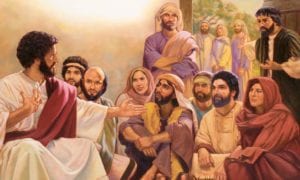
The Least of My Brothers
The conclusion of chapter 25 in the Gospel of Matthew portrays the Final Judgment that will accompany the Second Coming of Christ. At that time, the criterion of judgment will be the deeds of mercy that have been done for “the least of Jesus’ brothers”. An important question to ask is: Who are these least of Jesus’ brothers? Are they all the people who suffer hunger, thirst, etc.? Or are they a different group of people? The majority of bible scholars, both past and present, have understood that “the least of Jesus’ brothers” refer to disciples who are hungry, thirsty, strangers, naked, ill or imprisoned.
Let us consider the following passage where Jesus talks about who His brothers are:
While He was still speaking to the crowds, His mother and His brothers appeared outside, wishing to speak with Him. Someone told Him, “Your mother and your brothers are standing outside, asking to speak with you.” But He said in reply to the one who told Him, “Who is my mother? Who are my brothers?” And stretching out His hand toward His disciples, He said, “Here are my mother and my brothers. For whoever does the will of my heavenly Father is my brother, and sister, and mother.” (Matthew 12:46-50; cf. Mark 3:31-35)
Let us also consider the Letters of Paul, John and James where the words “brothers and sisters” refer to the Christian community: 1Corinthians 5:11; 1Corinthians 8:9-13; 1Thessalonians 4:6-7; Romans 14:10-21; Philemon 1:7; 1John 2:9-11; 1John 3:11-18; 1John 4:20-21; James 2:14-18; James 4:11.
In Matthew chapter 25, the caring for Jesus’s disciples equate with caring for Jesus; Jesus said: “Amen, I say to you, whatever you did for one of the least brothers of mine, you did for me. (Matthew 25:40)” Similarly in Matthew chapter 10, when Jesus sent out the Twelve to preach the Gospel, He said to them: “Whoever receives you receives me, and whoever receives me receives the one who sent me… And whoever gives only a cup of cold water to one of these little ones to drink because he is a disciple—amen, I say to you, he will surely not lose his reward. (Matthew 10:40, 42)”
The context of Matthew chapters 10 and 25 do not convey the general message: “if you care for the poor then you care for me.” At the Final Judgment, the nations of the world will be judged according to how they have treated Christ’s disciples; because ultimately, it equates to how they have treated Christ Himself. However, there is one caveat: It doesn’t mean that we should be indifferent to the needs of the non-Christian poor. The Catholic Church teaches that the corporal works of mercy, which include feeding the hungry, sheltering the homeless, clothing the naked, visiting the sick and imprisoned, should not discriminate against sex, race, color, language or religion.